Iran Launches First Long-Range Ballistic Missiles From Warship

Iran's Islamic Revolutionary Guard Corps (IRGC) said on Tuesday it has launched long-range ballistic missiles from a warship for the first time.

Iran's Islamic Revolutionary Guard Corps (IRGC) said on Tuesday it has launched long-range ballistic missiles from a warship for the first time.
The announcement came during naval exercises with the IRGC deploying two ballistic missiles from the Shahid Mahdavi warship.
The IRGC claims that the missiles can strike targets up to 1,700 kilometers (1,050 miles) away.
"The IRGC has initiated the firing of ballistic missiles in the Gulf of Oman for the first time," state television reported.
IRGC Chief Hossein Salami stated, "The launch of a long-range ballistic missile from the warship was executed with success."
In a warning on Tuesday, Salami said, "In the event of a naval conflict and our ships being targeted, we will respond with equal or greater force."
Additionally, state television reported that the IRGC conducted a simulation of a surface-to-surface ballistic missile strike on Israel's Palmachim airbase from central Iran. The base serves as a critical facility for F-35 fighter jets in Israel.
The military maneuvers unfold amid heightened regional tensions following the eruption of the Israel-Hamas conflict on October 7. Iran, which does not recognize Israel, has long opposed it and supported Palestinian terror groups since the 1979 Islamic revolution.
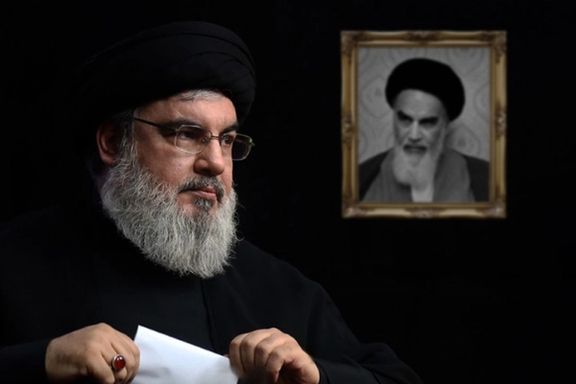
The leader of Iran-backed Hezbollah in Lebanon said on Tuesday that his group's cross-border shelling into Israel would only end when Israel's "aggression" on the Gaza Strip stops.
Hassan Nasrallah claimed that diplomatic efforts so far to bring a halt to hostilities along Lebanon's border seemed to only benefit Israel.
Hezbollah has been trading fire with the Israeli military across Lebanon's southern border in support of its Palestinian ally Hamas, since war started on October 7 that was met with heavy Israeli bombardment by land, air and sea.
Nasrallah said his group would only stop its exchanges of fire if a full ceasefire was reached for Gaza.
"On that day, when the shooting stops in Gaza, we will stop the shooting in the south," he said in a televised address.
He said many foreign "delegations" had travelled to Beirut with "proposals" to end hostilities in southern Lebanon, but said they only seemed to "have one goal, which is: the security of Israel, the protection of Israel."
The foreign ministers of France, Britain, and other countries have travelled to Lebanon in recent weeks to bring calm to the border.
France's foreign minister delivered a written proposal to Beirut that calls for Hezbollah's units to withdraw 10 km (6 miles) from the border.
"You read the paper - there's nothing. There's Israel's security," he said.
The cross-border shelling has already killed around 200 people in Lebanon, including more than 170 Hezbollah fighters, as well as 10 Israeli troops and five Israeli civilians. It has also displaced tens of thousands of people in each country.
Nasrallah said residents of northern Israel "will not return" to their homes and threatened that even more would be displaced.
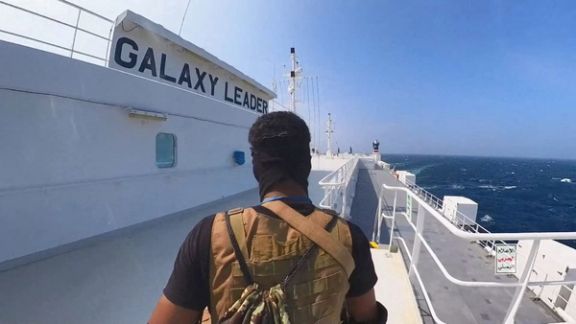
A State Department spokesman told Iran International that the Tehran-backed Houthis' Red Sea blockade not only threatens global food supplies but "now directly threatens even Iran’s own supply of food."
It follows an attack on a bulk carrier of corn traveling from Brazil to Iran on Monday. "This is just the latest, absurd example demonstrating that the Iranian regime supports terrorism and destabilizing behavior by groups like the Houthis at the expense of all the people of the region, including the Iranian people themselves," the spokesperson said.
Citing maritime sources, Reuters reported that the attack was the first time a ship headed for Iran was targeted amidst the Red Sea blockade, launched in November.
A regional security official told Reuters that the attack appeared designed to "show Iran does not control the Houthis and they act independently." They added that the Houthis had informed Tehran in advance, though so far Iranian officials are yet to comment on the allegations or the attack itself.
The Yemeni Houthis joined the proxy war which emerged in the aftermath of Iran-backed Hamas's attack on Israel on October 7. The deadliest day for Jews since the Holocaust, Hamas killed 1,200 mostly civilians and took at least 250 more hostage. Israel's relentless retaliation on the Gaza based militia has led to large swathes of the strip destroyed and around two thirds of the population at least displaced.
In solidarity, Iranian proxies in Iraq, Lebanon, Syria and Yemen have attacked both Israel and US targets, punishment for Biden's support of Israel's right to defend itself in the wake of the October atrocities.
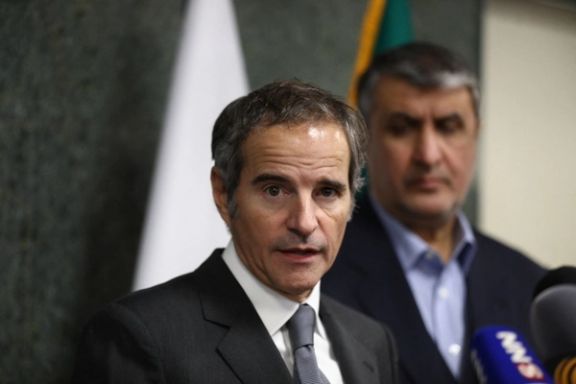
Rafael Grossi, the Director-General of the UN nuclear watchdog said Iran is “not entirely transparent," following worrying remarks by Iran's former nuclear chief, Ali Akbar Salehi.
In a televised interview, Salehi, who was also foreign minister (2010-2013), was asked if Iran has achieved the capability of developing a nuclear bomb. Avoiding a direct answer he stated, "We have [crossed] all the thresholds of nuclear science and technology."
Grossi addressed Salehi's warnings directly on Tuesday at Dubai’s World Government Summit. “There’s loose talk about nuclear weapons more and more, including in Iran recently. A very high official said, in fact, we have everything, it’s disassembled. Well, please let me know what you have,” he said.
To say that Iran is “presenting a face which is not entirely transparent when it comes to its nuclear activities”, as Grossi called it, will come as no surprise to the international community as Iran has repeatedly obstructed inspectors of the IAEA in their work to assess Iran’s nuclear enrichment.
In October, Iran branded IAEA inspectors political "extremists" as it tried to justify its standing in the way of vital work.
The head of the Atomic Energy Organization of Iran (AEOI), Mohammad Eslami, justified Tehran's decision to ban what Grossi said was around one third of the international inspection team, claiming those expelled had a history of "extremist political behavior”.
At the time, Eslami downplayed the scale of the ban, saying instead that it was an "insignificant" number expelled, contradicting the statement by Grossi in which he made a rare public criticism of the regime for its obstructive behavior in September.
An exasperated Grossi said in September: “With today’s decision, Iran has effectively removed about one third of the core group of the Agency’s most experienced inspectors designated for Iran,” adding that the move "affects in a direct and severe way the ability of the IAEA to effectively conduct its inspections in Iran.”
Just days ago, weapons expert David Albright told Iran International: “The transparency of the nuclear program has decreased significantly. Their [Iran’s] nuclear weapons capabilities have grown over the last several years … And it's also a point in time where people's attention is elsewhere. The Iran nuclear issue barely makes the newspapers these days.”
Amid a regional proxy-war led by Iran’s militias around the Middle East, the nuclear issue has taken a back seat as Iran's proxy groups in Iraq, Syria, Lebanon and Yemen have wreaked havoc in the wake of the Hamas invasion of Israel on October 7.
Hamas, the Iran-backed Palestinian group which controls Gaza, killed 1,200 mostly civilians and kidnapped at least 250 more, sparking a conflict with proxies attacking both Israel and US targets around the region.
Speaking of the current geopolitical crisis, Grossi warned: ”Of course this increases dangers.”
Salehi, who served as the head of the civilian Atomic Energy Organization of Iran under then-President Hassan Rouhani, is seen as a relative moderate within Iran and was one of the team who reached the 2015 nuclear deal with world powers.
But with a bubbling war boiling in the Middle East, orchestrated from Tehran, Grossi noted “an accumulation of complexities” is now erupting in the wake of the Gaza war.
In an article entitled ‘How Quickly Could Iran Make Nuclear Weapons Today?’, Albright recently wrote that it could be as little as a week.
“The long pole in the tent of building nuclear weapons is essentially complete,” he said. “Iran can quickly make enough weapon-grade uranium for many nuclear weapons, something it could not do in 2003. Today, it would need only about a week to produce enough for its first nuclear weapon. It could have enough weapon-grade uranium for six weapons in one month, and after five months of producing weapon-grade uranium, it could have enough for twelve.”
The Joint Comprehensive Plan of Action (JCPOA), reached by Iran, China, France, Germany, Russia, the United Kingdom, the US and the European Union, had set out rigorous mechanisms for monitoring restrictions placed on Iran’s nuclear program, while paving the way for the lifting of UN sanctions.
However, as the regime is going full steam ahead, there seems to be neither hope for reviving the agreement which collapsed under the Trump administration, nor hope for Iran’s slowing down.
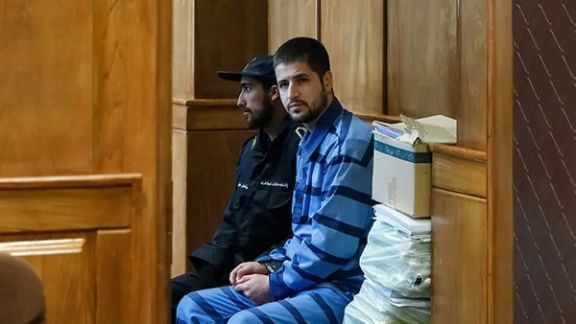
The lawyer representing Mohammad Ghobadloo, a protester executed in connection with the 2022 protests in Iran, has been summoned to court for criticizing the handling of his client's case.
Mahdokht Damghanpour, one of Ghobadloo's attorneys, was summoned to the Culture and Media Court after voicing numerous objections to the proceedings of her client's case.
In an interview with Didban Iran, Damghanpour previously stated that her client was executed despite requests from medical professionals and 50 psychiatrists to halt the execution.
She said her client was executed without notifying his attorneys, examining his mental health status again as per the Chief Justice's orders, informing his family, or granting him a final visit.
Ghobadloo was detained during the uprising which followed the death in morality-police custody of Mahsa Amini in September 2022. He was charged with running over a police officer with his car and causing his death, as well as other charges including "corruption on earth" and "waging war against God" in another case.
In a recent interview, Damghanpour claimed Ghobadloo was subjected to beatings and forced to confess before his execution last month.
So far, at least nine protesters have been executed in connection with the Women, Life, Freedom protests.

Iran’s hardliners appear to be sowing division among Reformists following a declaration by their main organization that they would not participate in elections in Tehran.
In fact, Iran’s election watchdog, the Guardian Council, packed with hardliners, has banned almost all Reformists from running in the March 1 parliamentary vote, leaving little choice to a coalition of parties known as the Reformists.
The February 10 statement by the Reform Front is effectively a call for boycotting the elections, although it states that it is only in Tehran that "Reformists find it impossible to take part and present a list of candidates" as none of their nominees had their qualifications endorsed by the Guardian Council. This way of putting their protest forward, acquits the Reform Camp of possible accusations of defying the regime.
Although the Reform Front’s statement stops short of outright boycotting the March 1 parliamentary and Assembly of Experts elections, a group of 110 self-proclaimed reform-minded intellectuals, civil, political, and media activists issued a call for reformists to participate. They argue that participation could provide a small avenue for reform-minded individuals to voice their concerns in parliament.
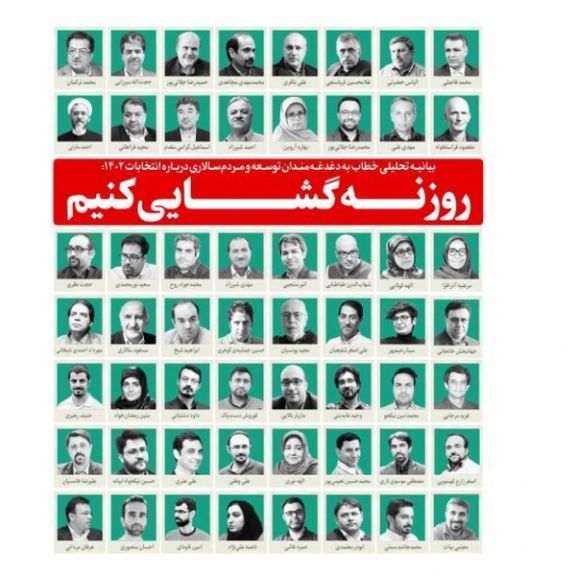
Citing extensive monitoring and evaluation of political developments, the Reformist Front emphasized the need for meaningful, competitive, and fair elections. They condemned arbitrary vetting and disqualification of candidates, which they believe undermines the people's choices and contributes to political, economic, social, and cultural crises. "We cannot take part in a meaningless, non-competitive, unfair election which is not going to have an impact on the way the country is governed."
The Front said that it has already "warned the government about the consequences of limiting the people's choices through arbitrary vetting and disqualification of the candidates," adding that "The discretionary supervision by the Guardian Council that limits the people's choices is one of the main reasons for the inefficiency of the Iranian government and has led to many political, economic, social, and cultural crises."
The Reforms Front further warned that "The officials and institutions that have made the polling box useless in Iran shall be responsible for the low turnout in the elections and its consequences" for the regime’s legitimacy. The Reformist Front further pointed out that "The only way to solve the country's problems is establishing a powerful and independent parliament and government by holding free and fair and competitive elections."
Announcing that this was a collective decision made by all the reformist parties in Iran, the front also expressed concern that measures including biased vetting that limits the voters' choices have been constantly on the rise during the past years.
Meanwhile, a statement issued on February 12 by a group of around 100 activists, including former Reformist lawmakers and media owners, urged people to participate in the elections and support a coalition of moderate and reform-minded candidates endorsed by the Guardian Council. Despite acknowledging the lack of fairness in Iran's elections, they advocated for participation to counter political purification efforts by the ruling conservatives.
The move dividing the Reformists could have well been encouraged by hardliners, as their media outlets jumped on the news to highlight that not all reformists have boycotted the elections.
Regardless of their all-out support for the government the activists in their statement acknowledged that "Like all of the elections in Iran's contemporary history, the upcoming plebiscite is totally far from free and fair and its organizers have been working hard to implement the idea of political purification" which means monopolizing political power in Iran in the interest of the ruling conservatives.
Social media users have accused the group of opportunism and looking for a weak and useless minority in the parliament. One social media user said: "They would take part in any Saddam Hussain-style election Khamenei may hold."